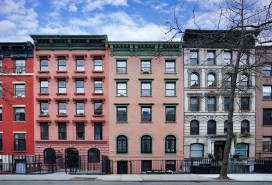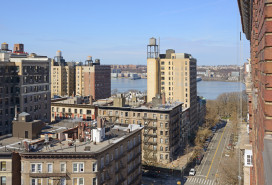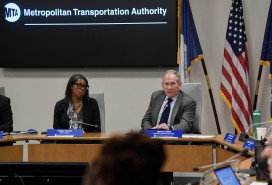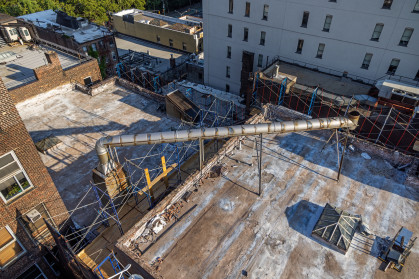Are your bylaws outdated? Here are 3 ways you can tell
- If your bylaws haven’t been touched in decades and are under 30 pages, you should consider an update
- Make sure your bylaws specifically address what permissions a resident needs for a renovation

Out of date bylaws could slow your board’s ability to address an issue, and lose valuable income in the process.
iStock
Your bylaws are essential to running your New York City condo or co-op building. They determine how elections work, the powers of your board, and what happens when residents break the rules. So why do some buildings let their bylaws languish unchanged for decades?
For starters, bylaws are difficult to change. It typically takes a 66 and two-thirds percent of the units or building’s common interest to change bylaws, making it an especially tricky task for larger buildings, says Jonharold Cicero, a real estate attorney at DL Partners, which represents condo and co-op buildings throughout NYC.
Despite the headache and politicking involved in updating bylaws, “It’s absolutely crucial to keep them up to date,” says real estate attorney Christopher Tarnok of DL Partners. “The biggest issue that comes around when we represent condo and co-op boards is understanding who is responsible for maintenance, repair, and replacement obligations. When something breaks and the bylaws are silent, that creates a gray area which invites a potential dispute.”
Examining the bylaws should be on every board’s 2024 to-do list. And if you’re not sure what sections might need to be updated, read on for three areas where condo and co-op buildings often get into trouble.
Do your bylaws set out what approvals are necessary to renovate?
Certain older buildings might have bylaws that barely outline how a resident could go about doing a significant amount of renovation work on their apartment, Cicero says.
“For some older townhomes in Brooklyn, those bylaws are like a pamphlet. When the client calls, I can look at the whole thing while we’re on the phone. They’re very, very skimpy,” Cicero says, noting that some condos and co-ops built in the 1980s have bylaws that are 30 pages, versus the bylaws of today, which typically run several hundred pages.
In the worst case he’s seen, one Brooklyn building was left without any renovations guidance whatsoever. This led to a protracted process of finger pointing, threatened litigation, and assessments to cover the renovation costs before a resolution was reached and the bylaws were revised to avoid similar issues in the future, Tarnok says.
If your bylaws don’t define what permissions a resident needs to renovate, costly deliberations with owners may ensue, which could lead to delays in the performance of work as well as attorneys’ fees if obligations are not clearly defined. Potential buyers can be turned off by the prospect of time-consuming negotiations, especially if they intend to perform renovations.
“We often get calls right when a buyer is about to close, who wants to come to some agreement,” says Cicero. “Buyers looking to make some updates to the unit are usually interested in the building’s alteration agreement and the rules and regulations governing the performance of renovation work.”
Do your bylaws outline what your board can do if a resident is in default?
Hopefully, none of your residents will fall into arrears on their maintenance fees or common charges. But if they do, you need to make sure your bylaws lay out a path for the board to collect arrears and the cost and expenses, such as attorneys’ fees, incurred in collection.
“Those provisions of the bylaws are there to provide remedies for the board on what actions they can take against a defaulting unit owner,” Tarnok says. “Default provisions provide a timeline for a resident to cure the default, as well as what charges are passed through to the unit owner. But some bylaws might only have a simple default provision that’s about 20-plus years old that may not so clearly lay out the Board’s remedies.”
Out of date bylaws could slow your board’s ability to address the issue, and lose valuable income in the process. That’s a huge risk, particularly for small buildings that work on tighter budgets, Tarnok says.
Do your bylaws specify who is responsible for garage repairs?
Buildings with parking garages have had to adapt to new regulations under Local Law 126 that require their garages to be checked for unsafe conditions this year. But for a lot of those properties, it’s unclear who is responsible for repairing the garage if there’s an issue.
“It was never contemplated in these older condominiums whose obligation it is to comply with Local Law 126,” Cicero says. “Is it the building’s obligation because they use the garage? Is it the garage operator’s obligation as the operator? Is it the owner of the garage unit, who then leases it out to an operator?”
That can quickly become a problem if your building uncovers structural problems with its garage. If your bylaws are silent, your board risks wasting time trying to interpret who needs to pay for repairs when it should be making the fix as quickly as possible, Cicero says.
“Your board will benefit from clarity,” Tarnok says. “It’s all building governance, and you need people to understand what their rights are.”
“You don’t want to spend time in meetings discussing issues at a period of time when the last thing you need to do is waste time trying to find who is responsible,” Tarnok continued. “You want something to get done fast.”
New York City real estate attorneys Jonharold A. Cicero and Christopher M. Tarnok are Partners at the real estate law firm DL Partners, offering innovative legal services to co-op and condo boards, developers, condominium sponsors, architects, contractors, property owners and brokers. For a complimentary 15-minute consultation on a real estate matter, send an email to Christopher or call (212) 624-4185
Sign Up for our Boards & Buildings Newsletter (Coming Soon!)
Thank you for your interest in our newsletter. You have been successfully added to our mailing list and will receive it when it becomes available.


















